
At the dawn of the 1990s, it seemed that Amazonia had become irrevocably trapped in a downward spiral of deforestation, environmental destruction and social conflict. Yet over the past ten years a more acute awareness has emerged at all levels, national and international, of the need to encourage more sustainable policies and practices. That is, measures that provide for the economic development needs of Amazonia's diverse population, while at the same time conserving and managing the region's natural resource base. At a major conference, organised in London in June 1998 by the Institute of Latin American Studies (Amazonia 2000: Development, Environment and Geopolitics), over twenty international scholars traced the evolution of this gradual shift in thinking. The present volume, based on that conference, examines past patterns of destructive resource extraction in Amazonia and, more importantly, critically analyses a series of newer initiatives that offer more sustainable options. These include, amongst others, new production strategies, such as agroforestry, innovative resource governance models such as inland fisheries co-management and agro-ecological zoning. The challenge at this critical juncture is how to integrate such policies and practices into mainstream development within Amazonia. Contributors: David Cleary, Rene; Dreifuss, Philip Fearnside, Jessica Groenendijk, Anthony Hall, Judith Kimerling, Tom Lovejoy, Dennis Mahar, David McGrath, Emilio Moran, Darrel Posey, Nigel Smith, and Wouter Veening.
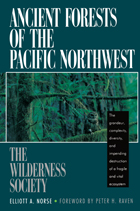
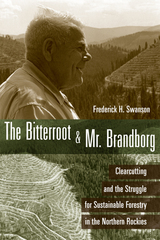
Winner of the Wallace Stegner Prize in American Environmental or Western History
Fredrick Swanson tells the story of Guy M. Brandborg and his impact on the practices of the U.S. Forest Service. As supervisor of Montana’s Bitterroot National Forest from 1935 to 1955, Brandborg engaged in a management style that promoted not only the well-being of the forest community but also the social and economic welfare of the local people. By relying on selective cutting, his goal was to protect the watersheds and wildlife habitats that are devastated by clear-cutting, and to prevent the job losses that follow such practices. Following his retirement, he became concerned that his agency was deviating from the practice of sustained-yield management of the forest’s timber lands, and led a highly visible public outcry that became known as the Bitterroot controversy. Brandborg’s behind-the-scenes lobbying contributed materially to the passage of the National Forest Management Act of 1976, the single most important law affecting public forestry since the creation of the Forest Service.
Winner of the Western Writers of America Spur Award for Best Western Nonfiction-Contemporary.

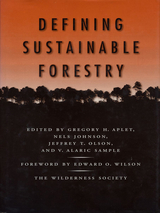
Before the transition in forestry can be made from conventional approaches of the past century to the ecosystem approach of the next, a consensus must be reached on the meaning of "sustainable forestry." Defining Sustainable Forestry presents the results of a national conference convened by The Wilderness Society, American Forests, and the World Resources Institute to help establish a common framework upon which to guide the future development of forestry.
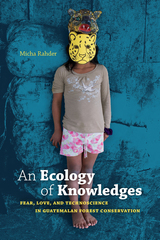

Not by Timber Alone presents the findings of the Harvard Institute for International Development study, commissioned by the International Tropical Timber Organization, that examined the economic value of tropical hardwood forests as productive living systems and the potential for their multiple use management.
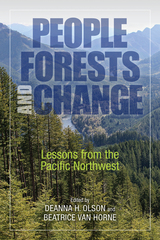
In People, Forests, and Change: Lessons from the Pacific Northwest, editors Deanna H. Olson and Beatrice Van Horne have assembled an expert panel of social and forest scientists to consider the nature of forests in flux and how to best balance the needs of forests and the rural communities closely tied to them. The book considers the temperate moist-coniferous forests of the US Pacific Northwest, but many of the concepts apply broadly to challenges in forest management in other regions and countries. In the US northwest, forest ecosystem management has been underway for two decades, and key lessons are emerging. The text is divided into four parts that set the stage for forests and rural forest economies, describe dynamic forest systems at work, consider new science in forest ecology and management, and ponder the future for these coniferous forests under different scenarios.
People, Forests, and Change brings together ideas grounded in science for policy makers, forest and natural resource managers, students, and conservationists who wish to understand how to manage forests conscientiously to assure their long-term viability and that of human communities who depend on them.
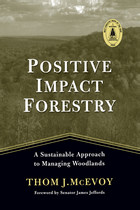
Positive Impact Forestry is a primer for private woodland owners and their managers on managing their land and forests to protect both ecological and economic vitality. Moving beyond the concept of "low impact forestry," Thom McEvoy brings together the latest scientific understanding and insights to describe an approach to managing forests that meets the needs of landowners while at the same time maintaining the integrity of forest ecosystems. "Positive impact forestry" emphasizes forestry's potential to achieve sustainable benefits both now and into the future, with long-term investment superseding short-term gain, and the needs of families -- especially future generations -- exceeding those of individuals.
Thom McEvoy offers a thorough discussion of silvicultural basics, synthesizing and explaining the current state of forestry science on topics such as forest soils, tree roots, form and function in trees, and the effects of different harvesting methods on trees, soil organisms, and sites. He also offers invaluable advice on financial, legal, and management issues, ranging from finding the right forestry professionals to managing for products other than timber to passing forest lands and management legacies on to future generations.
Positive Impact Forestry helps readers understand the impacts of deliberate human activities on forests and offers viable strategies that provide benefits without damaging ecosystems. It speaks directly to private forest owners and their advisers and represents an innovative guide for anyone concerned with protecting forest ecosystems, timber production, land management, and the long-term health of forests.
Named the "Best Forestry Book for 2004" by the National Woodlands Owners Association
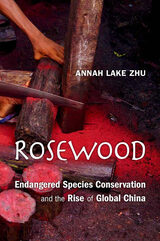
A riveting study of the booming rosewood trade between China and Madagascar uncovers an alternative approach to environmentalism that disrupts Western models.
Rosewood is the world’s most trafficked endangered species by value, accounting for larger outlays than ivory, rhino horn, and big cats put together. Nearly all rosewood logs are sent to China, fueling a $26 billion market for classically styled furniture. Vast expeditions across Asia and Africa search for the majestic timber, and legions of Chinese ships sail for Madagascar, where rosewood is purchased straight from the forest.
The international response has been to interdict the trade, but in this incisive account Annah Lake Zhu suggests that environmentalists have misunderstood both the intent and the effect of China’s appetite for rosewood, causing social and ecological damage in the process. For one thing, Chinese consumers are understandably seeking to reclaim their cultural heritage, restoring a centuries-old tradition of home furnishing that the Cultural Revolution had condemned. In addition, Chinese firms are investing in environmental preservation. Far from simply exploiting the tree, businesses are carefully managing valuable forests and experimenting with extensive new plantings. This sustainable-use paradigm differs dramatically from the conservation norms preferred by Western-dominated NGOs, whose trade bans have prompted speculation and high prices, even encouraging criminal activity. Meanwhile, attempts to arm conservation task forces—militias meant to guard the forests—have backfired.
Drawing on years of fieldwork in China and Madagascar, Rosewood upends the pieties of the global aid industry. Zhu offers a rigorous look at what environmentalism and biodiversity protection might look like in a world no longer dominated by the West.
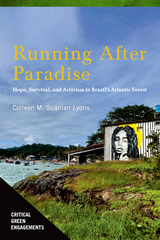
The pressures on this tropical forest are palpable. So are people’s responses to these pressures. What was once the state’s economic mainstay, cacao production, is only now beginning to make a comeback after a disease decimated the crops of large and small farmers alike. Tourism, another economic hope, is susceptible to economic crises and pandemics. And the threat of a massive state-led infrastructure project involving mining, a railroad, and an international port has loomed over the region for well over a decade.
Southern Bahia is at a crossroads: develop a sustainable, forest-based economy or run the risk of losing the identity and soul of this place forevermore. Through the lives of environmentalists, farmers, quilombolas, and nativos—people who are in and of this place—this book brings alive the people who are grappling with this dilemma.
Anthropologist Colleen M. Scanlan Lyons brings the eye of a storyteller to present this complex struggle, weaving in her own challenges of balancing family and fieldwork alongside the stories of the people who live in this dynamic region. Intertwined tales, friendships, and hope emerge as people both struggle to sustain their lives in a biodiversity hotspot and strive to create their paradise.


The world's montane forests are vitally important for conservation and water catchment. Because logging regimes have significant impacts on biodiversity as well as water quality and water quantity, the management of these forests has often been a major source of conflict amongst rural communities, government agencies, and conservationists. Although much information on ecologically sustainable managment practices is now available, further organizational change and policy tranformation is needed to see a transition to sustainable practices inplemented on the ground.
Towards Forest Sustainability contains practical essays by some of the world's leading forests ecologists and managers from the United States, Canada, Finland, Sweden, Australia, and New Zealand. The authors describe the changes that have taken place in forest management- highlighting what worked, what didn't, and the lessons that have been learned.
This unique collection of essays documents the drivers of the change in the logging industry and the resulting outcomes, both the good and the bad. The book provides real-world insights from an international perspective into government policy, industrial concerns, and conservation and biodiversity issues.

The Wildlands and Woodlands vision, as described in two previous Harvard Forest publications, calls for collaboration among conservationists and willing landowners to permanently protect at least 70 percent of the New England landscape as forests by 2060. Another 7 percent of land that is currently in agriculture would remain intact for wildlife and people. This series advocates a balanced approach to conservation and preservation; most land would be actively and sustainably managed for wood, food, and other values, while continuing to provide clean water and air, wildlife habitat, recreation, and support for human lives in a changing environment. About a tenth of the forest, along with associated wetlands, streams, ponds, and other habitats, would comprise large wildland reserves.
This 2017 report offers new data on progress toward these goals and outlines complementary uses of the forest and agricultural landscape with thoughtful and efficient development of rural villages and towns, suburbs, and cities—to support people and nature across New England. It ends with recommendations to protect and care for the land that can forge a bright future for New England, provide a regional example for the nation, and help mitigate global environmental change.
READERS
Browse our collection.
PUBLISHERS
See BiblioVault's publisher services.
STUDENT SERVICES
Files for college accessibility offices.
UChicago Accessibility Resources
home | accessibility | search | about | contact us
BiblioVault ® 2001 - 2024
The University of Chicago Press









